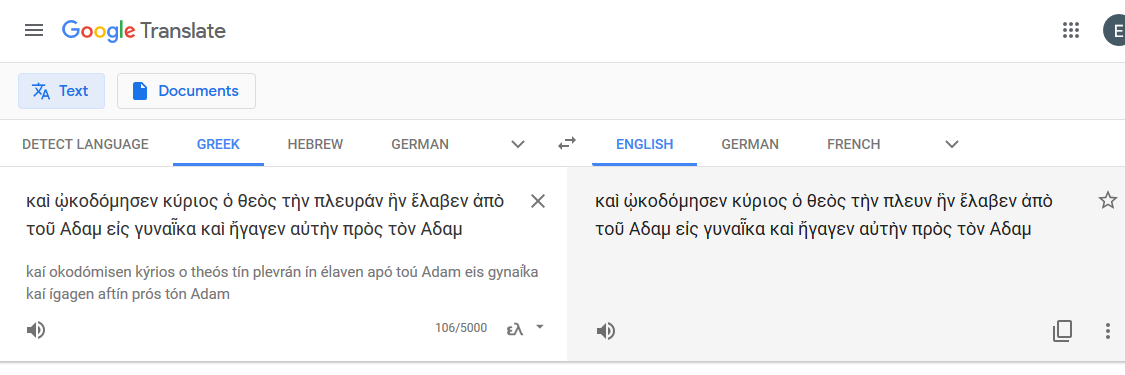
September 6, 2020
I was curious about the translation of Genesis 2:22 in the Septuagint (the earliest Greek translation of the Hebrew Bible, dating from roughly the second century BCE). In English, the verse reads, "And the Lord God built the rib that he had taken from the man into a woman; and he brought her to the man." However the Hebrew word צלע "tzela" is a rare one in the Bible, and only refers to a body part here and in the preceding verse, so the translation "rib" is uncertain. In fact, the rabbis of the Talmudic period (2nd and 3rd centuries CE) disagree as to whether it means Adam's rib, his side, or even (strangely) his tail (Eruvin 18b). So I wanted to see what the Septuagint, which is centuries earlier, had done. However, I don't know Greek, either ancient or modern.
The Septuagint on Genesis 2 is available online here. Genesis 2:22 reads as follows:
καὶ ᾠκοδόμησεν κύριος ὁ θεὸς τὴν πλευράν ἣν ἔλαβεν ἀπὸ τοῦ Αδαμ εἰς γυναῗκα καὶ ἤγαγεν αὐτὴν πρὸς τὸν ΑδαμI cut and pasted this into Google Translate. The result was as follows:

As can be seen, Google Translate simply took the text on the Greek side and copied it onto the English side.
Two explanations suggested themselves. First, character encodings have been the bane of natural language processing programs for decades (especially non-English character sets, but I have encountered anomalies in copying and pasting English text with ligatures); it is possible that the Septuagint web page used a character set that Google Translate didn't know. However, as you can see in the above image, Google Translate did succeed in transliterating the Greek correctly (as far as I can tell), and when I clicked on the speaker icon, it pronounced the text, seemingly correctly, though I think (I certainly can't be sure) that there were a couple of words where it spelled out the letters rather than pronouncing the word. It would seem odd that the transliteration and speech production modules would be familiar with the character set while the translation module wasn't; but such inconsistencies are certainly common enough. Also, of course, the display functionality in the Google window worked correctly; but that is probably client-side (i.e. on my machine) in any case.
The second explanation was that Greek has changed a lot in 2200 years and perhaps Google Translate, trained on Modern Greek, found this verse unintelligible.
To test the first possibility, I recopied, as best I could, the text using a different Greek keyboard (the one at branah.com) and used that as the input to Google Translate. I had no idea how to do the accents, and I may have miscopied; but the text as I copied it was as follows:
και ωκοδομησεν κυριος ο θεος την πλευραν ην ελαβεν απο τον Αδαμ εις γυναικα και ηγαγεν αυτην προς τον Αδαμ
The result was the same: Google Translate simply copied the Greek text from the input side to the English side.
However things were not so simple. If I entered into Google Translate only
the first seven words:
και ωκοδομησεν κυριος ο θεος την πλευραν
Google Translate translated it more or less correctly: "And God built the side"
But as soon as I added the eighth word ην it switched the whole translation to Greek.
Another oddity: The word ωκοδομησεν means "built". As far as I can tell from online Greek dictionaries, it is not a word in modern Greek. If you just give Google Translate that single word, it simply copies it, which in itself would be reasonable enough for a word it doesn't know. However, as you can see, in the context of the first seven words, it does "realize" that its translation is "built".
Finally, to complete the anomaly: If instead of typing the first seven words from the online keyboard I cut and paste them from the Septuagint site, Google Translate again simply copies the Greek. So presumably there is some difference in character encoding. But if I cut and paste the single word θεὸς it correctly translates it as "god".
There must be some combination of effects in play here, but I am at a loss to come up with an explanation, except to say that, when one is at the boundaries of what an AI program can do, the behavior can be very erratic.
Getting back to Adam: The word the Septuagint uses to translate "tzela" is πλευραν. Googling that, Wiktionary tells me that πλευρά means:
(It is also used a number of times in the New Testament — Matthew 27:49; John 19:34, 20:20, 20:25, 20:27; Acts 12:7 — where it is consistently translated "side".)
Acknowledgements: Thanks to Jim Hendler for pointing out the strange passage in Eruvin, and thus getting me started on this.